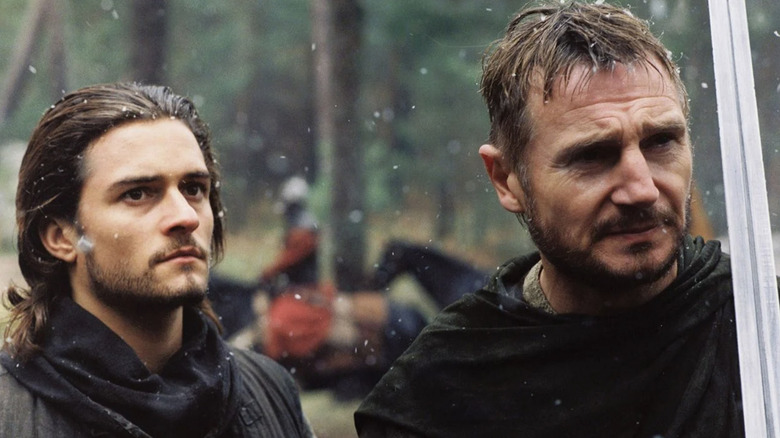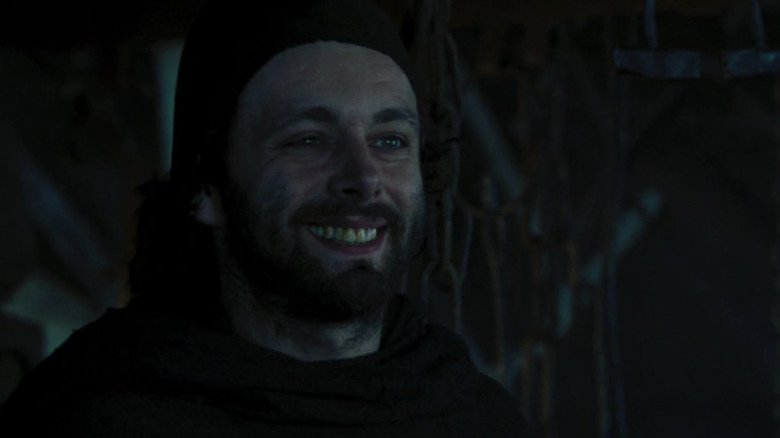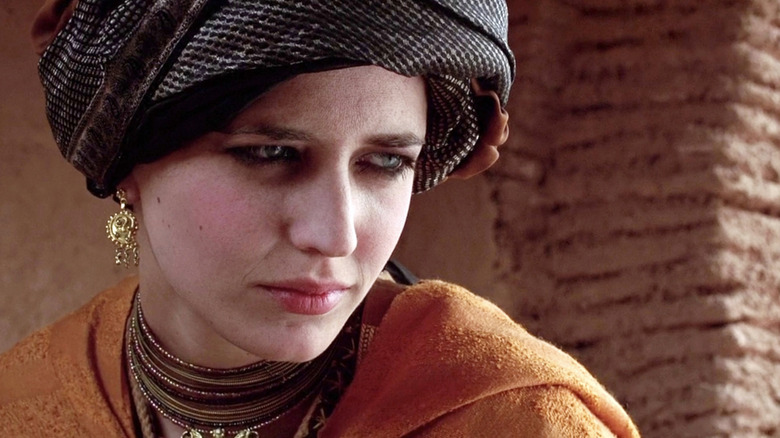The Scrapped Kingdom Of Heaven Scene That Made Ridley Scott Want A Director's Cut
Ridley Scott is no stranger to the necessity of a director's cut. Rather famously — or infamously, depending on where you begin the story — his seminal sci-fi adaption "Blade Runner" flopped before being resurrected a decade later by his definitive version. But how does one determine when a director's cut is essential? Typically directors use them to overcome constraints imposed either by the studio or its length, usually by reinserting exposition that pushes run time well past the three-hour mark.
Such was the case for "Kingdom of Heaven" and its tale of the blacksmith Bailan (Orlando Bloom) whose journey to Jerusalem for redemption in the midst of the 12-century Crusades turns into a brutal confrontation with the Christian theocratic fanatics who orchestrate them. But according to Scott his version of the film was hamstrung by studio demands to shrink it down. And just like with "Blade Runner," he sought to remedy his acquiescence with a director's cut.
Why Scott wanted the director's cut released
In an interview with the RealBlend, Scott revealed that he counted his director's cut for "Kingdom of Heaven" as the last time one was "really relevant" for him. The reason? It was this cut that accentuated many of the historical threads that first intrigued Scott when screenwriter William Monahan brought him the script. But when the theatrical cut was released he had to deal with what he called the "agony and ecstasy" of previews. Which included all the opinions being spouted "about the crusades and the 'infidels,' that we weren't the bad guys, and the Arab community was," something both Scott and his film fiercely rebuked.
Of course, harming the sensibilities of a few historians still idealizing the Crusades seems a small price to pay. But those weren't the only criticisms that would be levied at the film once it was released. Although it provided the kind of grandiose storytelling and action that have made Scott's previous historical epics incredible spectacles — the narrative arcs of many central characters felt clipped short. So while the actors themselves received praise for their performances, the whole thing felt like it was missing a few crucially interlinking scenes.
Which of course were inserted back into the film, along with the 45-minutes worth of extra footage, when Scott released his director's cut. Fleshing out crucial context about Bailain's life leading up to the suicide of his wife and his reasons for instantaneously murdering his half-brother/the village priest (Michael Sheen). But it also restored a number of important scenes involving Sibylla (Eva Green) and her son — which were pulled directly from the history books and became responsible for catalyzing Scott's enthusiasm for "Kingdom of Heaven" in the first place.
The director's cut restored many of Sibylla's scenes
Out of all the characters in "Kingdom of Heaven," the theatrical cut is the most damaging to the story of Sibylla. What's ironic is that it's mostly her story that Scott was fascinated by when Monahan told him he'd found an "interesting piece of history." Although it apparently wasn't interesting enough to keep in the film, since both Sibylla's accidental discovery that her son Baldwin V has contracted leprosy like his uncle King Baldwin IV (Edward Norton) and her decision to euthanize him by pouring poison into his ear were removed from the theatrical cut of "Kingdom of Heaven."
In fact, you don't even see the child at all in that version of the film, even though the entire subplot only amounted to 17 minutes. "And to my regret, I removed the 17 minutes," Scott told RealBlend. "Because people are saying 'The film's long, why do you need this part,' and how wrong they were." But those scenes are what ground the whole film in the distant historical past in which it was set.
They're also necessary for understanding why Sibylla ends up supporting Guy de Lusignan when he's crowned king after her son's death. Instead of being portrayed as this two-dimensional character who coldly accepts her fanatical husband's rise to power, the director's cut reveals her as a mother paralyzed by grief and despair. Which in turn lends far more weight to the way she claws her way out of that state during the siege of Jerusalem. By the end of "Kingdom of Heaven," Sibylla has transformed as much as Bailan, going from disenchanted royal to risking her life to bandage the wounded and give peace to the dying.


